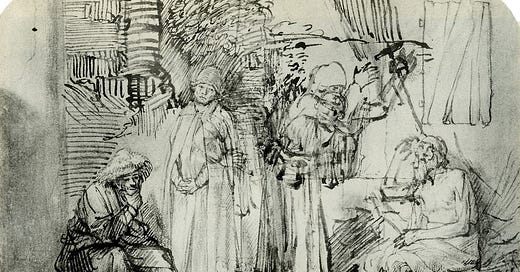Thoughts on Job
“Though he slay me, I will hope in him…” (Job 13:15)
(“Job, his wife, and his friends” by Rembrandt)
As we’re teaching through the book of Job this month, here’s a few random thoughts to enrich our study.
Here’s a helpful reflection from Ray Ortlund:
I used to think the book of Job is in the Bible because it presents a rare and extreme case of human suffering. “Look at this worst case scenario. If you can see the truth here, then surely in your comparatively small problems . . . .”
Now I think the book of Job is in the Bible because the story is so common. Many are wondering, “What on earth has happened to me? What have I done that explains this devastation? Where is God in this?”
Enter Job’s three friends. They were cautious at first. But with their tidy notions threatened by his untidy realities, the moralism started pouring out of them: “Come on, Job, get real with us. You must have some dirty secret that explains all this. Admit it, and this misery will start going away.” Their finger-pointing oversimplifications intensified Job’s sufferings, and this too is a common experience.
I don’t think the book of Job is about suffering as a theoretical problem — why do the righteous suffer? I think it’s about suffering as a practical problem — when (not if) the righteous suffer, what does God want from them? And what he wants is trust. When the righteous cannot connect the realities of their experience with the truths of God, then God is calling them to trust him that there is more to it than they can see. As with Job, there is a battle being fought in the heavenlies.
Trust in God, not explanations from God, is the pathway through suffering.
Here’s a beautiful song by Shane and Shane that takes the words of Job and helps us sing the language of lament.
This satirical article may or may not show up in tomorrow’s sermon.
LAND OF UZ — According to sources, local man Job is experiencing unspeakable suffering, having been stricken with painful boils after losing his house, his children, and all his possessions. Fortunately, his three friends — Eliphaz the Temanite, Bildad the Shuhite, and Zophar the Naamathite — paid him a visit this morning and offered to cheer him up with a song on the recorder.
"Behold, thy soul is downcast, and thy spirit grieved," began Eliphaz. "Surely you will cheer up after I play my somewhat competent recorder rendition of 'Hot Crossed Buns!'"
Witnesses say Job cringed mightily as his three friends then took turns playing their best versions of "Old MacDonald", "Twinkle, Twinkle, Little Star," and "Ode to Joy" on the small plastic recorders they had saved from grade school.
"It is better for me to die than to live," said Job at the end of the performance, much to his friends' disappointment.
At publishing time, Zophar the Naamathite offered to switch things up and lift Job's spirits with an epic tuba solo.
This is an excellent article by Eric Ortlund: We Are Both Job and Job’s Friends
P.S. Don’t forget about the homework for this week! We’ll study Job’s Friends, so to prepare yourself, I encourage you to read Job 4-37. (If you haven’t started yet, it’s not too late to binge read and catch up!)
“For I know that my Redeemer lives…” (Job 19:25)





